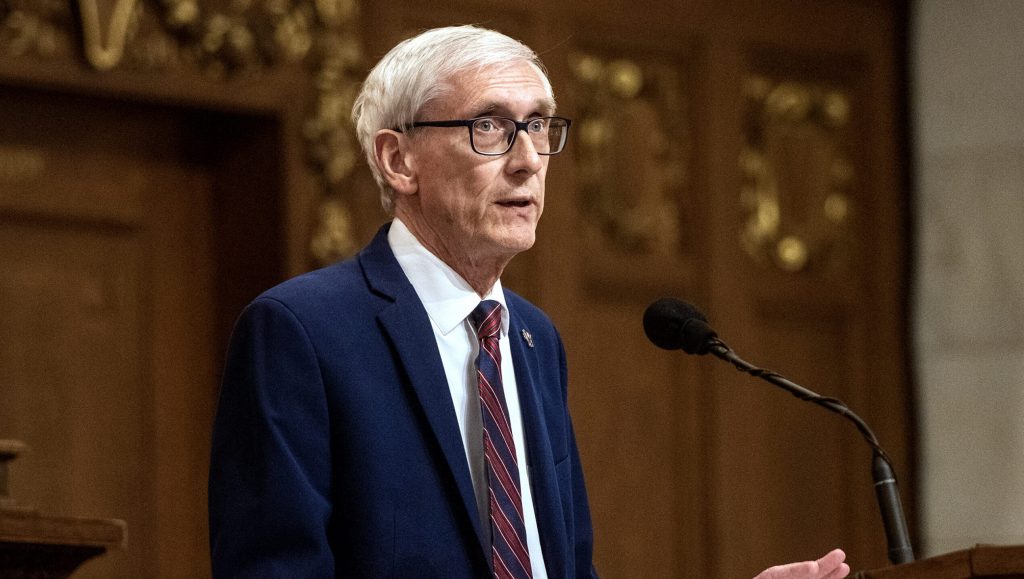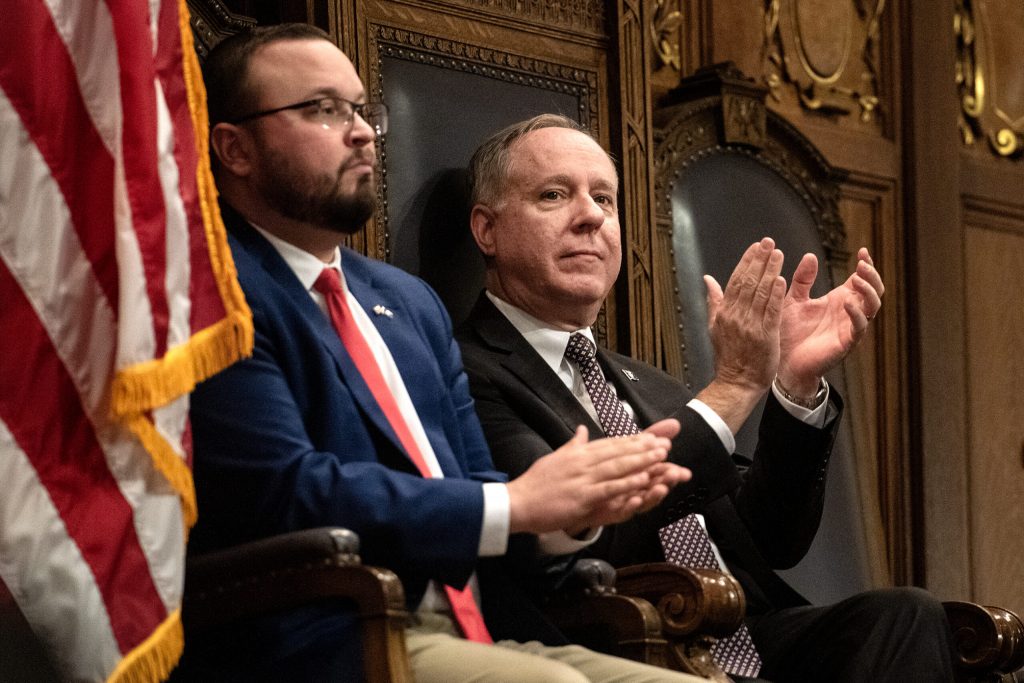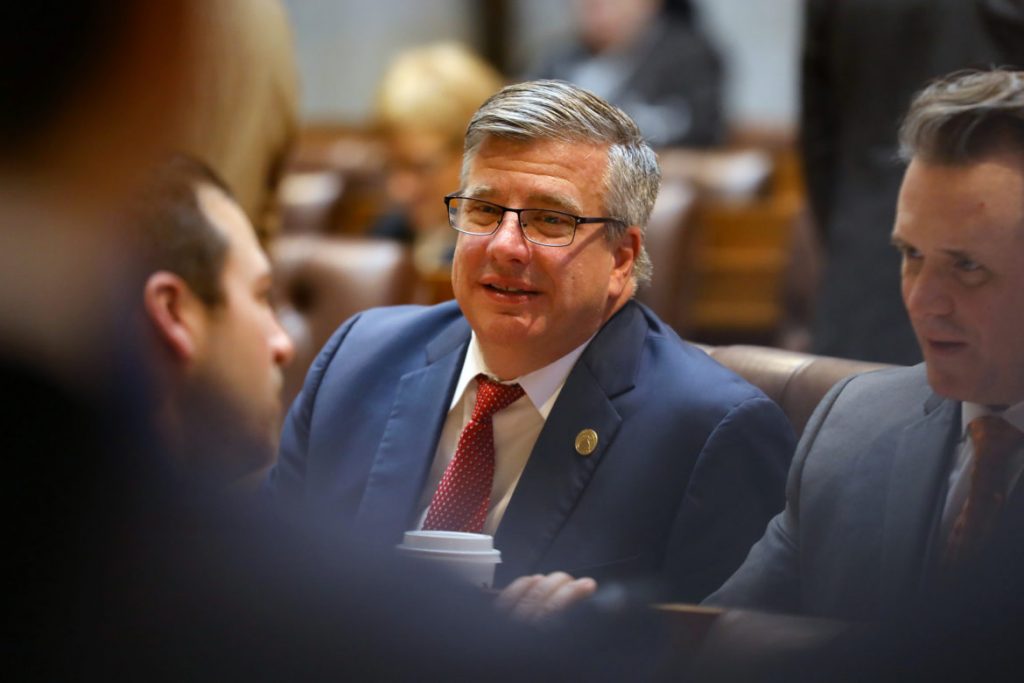Wisconsin Surplus Is Nearly $4.3 Billion. How Much Will Be Spent?
Fights over the surplus have become common, a big change from years ago.

Gov. Tony Evers delivers the biennial budget message Wednesday, Feb. 15, 2023, at the Wisconsin State Capitol in Madison, Wis. Angela Major/WPR
As Gov. Tony Evers puts the finishing touches on his next state budget proposal, projections show Wisconsin is expected to see a surplus of around $4.3 billion.
It sets the stage for a familiar battle, with the Democratic governor calling for investments in priorities like education and child care and leaders of the Republican-controlled state Legislature calling for tax cuts.
While the surplus is large, it’s not exactly new. Two years ago, Evers and lawmakers began the budget cycle with a projected $7 billion surplus. And even after they passed a new budget that increased spending and cut some taxes, the state ended last fiscal year with $4.6 billion in the bank.
Those figures refer to the state’s general fund, which is like its main checking account. There’s an additional $1.9 billion in reserves in Wisconsin’s rainy day fund.
Expect another round of battles over spending, tax cuts
Evers will give his two-year budget address on Tuesday, but he’s already given indications of how he’d like to spend some of the state’s excess money. During his State of the State Address on Jan. 22, Evers vowed to put hundreds of millions of dollars toward student mental health services, child care and violence prevention.
After Evers’ speech, Wisconsin Assembly Speaker Robin Vos, R-Rochester, said it amounted to “a whole lot of things that are not going to happen in Wisconsin.”

Wisconsin Assembly Speaker Robin Vos, right, awaits Gov. Evers’ State of the State address Wednesday, Jan. 22, 2025, at the Wisconsin State Capitol in Madison, Wis. Angela Major/WPR
The Republican-controlled Joint Finance Committee has all but scrapped Evers’ recent budget proposals and written their own. In a statement reacting to the state’s revenue projections, Sen. Howard Marklein, R-Spring Green, and Rep. Mark Born, R-Beaver Dam, who co-chair the panel, said they are encouraged but cautious about the future.
“Our cost-to-continue remains substantial and even with these expected revenue increases, we must remain vigilant when crafting a budget for Wisconsin,” their joint statement said.
They also said the multi-billion dollar surplus “remains here in the state coffers instead of the pockets of hard working Wisconsinites” because Evers has vetoed the bulk of GOP tax cut legislation.
“These estimates show that not only can we continue to fund our obligations and priorities, but that we can also give substantial tax relief to hard-working Wisconsinites,” they said.
Former budget committee co-chairs say one-time money can be a benefit and potential burden
While fights over a multi-billion state surplus have been common in recent years, it hasn’t always been that way.
John Nygren and Mark Miller have both been in the hot seat during state budget negotiations before. Nygren, a former Republican state representative from Marinette, co-chaired the Legislature’s budget committee from 2013 until 2020. Miller, a former Democratic state senator and Senate minority leader, co-chaired the panel from 2007 to 2010.
“We just basically entered into a negative budget using one-time money,” Miller said. “And that was money that came from the feds.”
Miller’s tenure on the finance committee coincided with the Great Recession, which left states reeling as the nation’s housing market collapsed. He said a temporary infusion of stimulus funds from the federal American Recovery and Reinvestment Act was vital to balance the state’s finances. “It was risky, but that was the only way we could keep sort of the funding going forward for schools,” Miller said.
If he had a surplus to work with, Miller said he would have liked to invest it in public schools and state colleges.
Part of the current budget surplus can be attributed to other pots of one-time federal funds that were approved at the federal level by President Donald Trump and former President Joe Biden to offset the financial effects of the COVID-19 pandemic.

State Rep. John Nygren, R-Marinette, is seen at the State of the State address at the Capitol in Madison, Wis., on Jan. 24, 2018. Coburn Dukehart/Wisconsin Center for Investigative Journalism
Nygren, who now works as a lobbyist for the Wisconsin Association of Health Plans, said using one-time money for ongoing expenses “just creates an ever bigger hole in the future.”
Nygren also noted that a tax cut, as it’s scored by the Legislative Fiscal Bureau, “is an ongoing expense as well.”
Nygren also knows what it’s like to oversee the finance committee process during one-party rule and split government. For five years of his tenure, Republicans held the Legislature and governor’s office. During Nygren’s last two years as co-chair, Evers was governor. He said split government makes it “a little more difficult” for spending increases to come to fruition.
“So, I think this process is just so up in the air right now, not only because of the makeup of the Legislature and the governor’s office, but also because of the fact that the big number out there is one-time money, not ongoing revenues,” Nygren said.
Wisconsin surplus projected at nearly $4.3B as Evers prepares next state budget was originally published by Wisconsin Public Radio.
If you think stories like this are important, become a member of Urban Milwaukee and help support real, independent journalism. Plus you get some cool added benefits.






















Please send the money back to the taxpayers who created the surplus!
They should just add it to the rainy day fund and forget about it. $4+ billion isn’t much in a state with an annual budget in the range of $50 billion. Less than $800 per capita. If they apply it as a refundable tax credit, yes, go ahead and send me my $800 free money. But they’ll never do that. It would likely exacerbate inflation which is already going up again since Trump was elected (and likely to increase more going forward). Could be we’re headed toward another Republican recession. Republican administrations always lead to recessions (Eisenhower 1953 and 1957, Nixon / Ford 1969 and 1973, Reagan / Bush 1981 and 1990, Bush II 2001 and 2008, and Trump 2020). Wisconsin might be glad there are adequate reserves available down the road to mitigate the consequences.
Too bad the President that Ryan voted for is now screwing up
Federal Funding so badly that we don’t know how many more state tax dollars are going to be needed merely to stay at that cost-to-continue level. It would be crazy to cut taxes if we don’t know how much we’re going to be left hanging by the Trump Administration.
That should be something Evers and Dems say constantly for the next 4 months – “No way are we cutting income taxes as long as Trump/Musk keep screwing things up in DC.” Any taxes to cut should be property taxes, done by adding state funding to public schools and local governments.